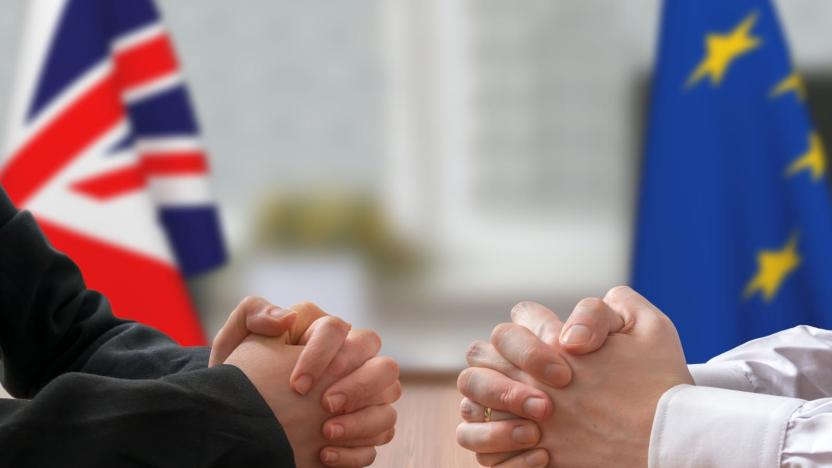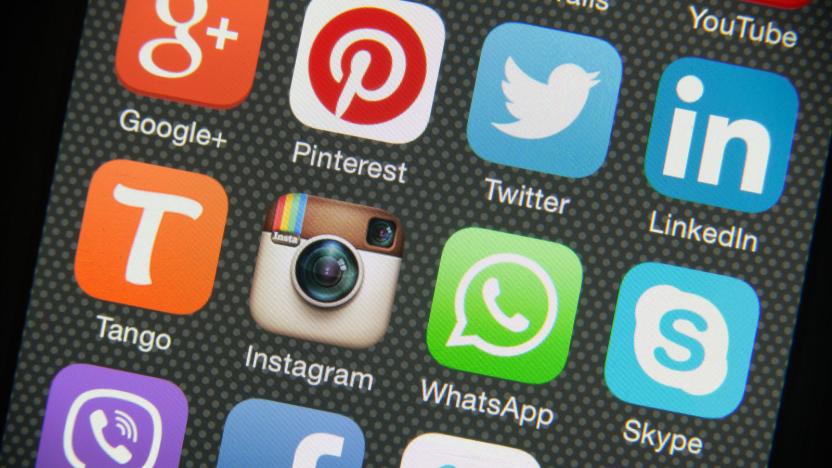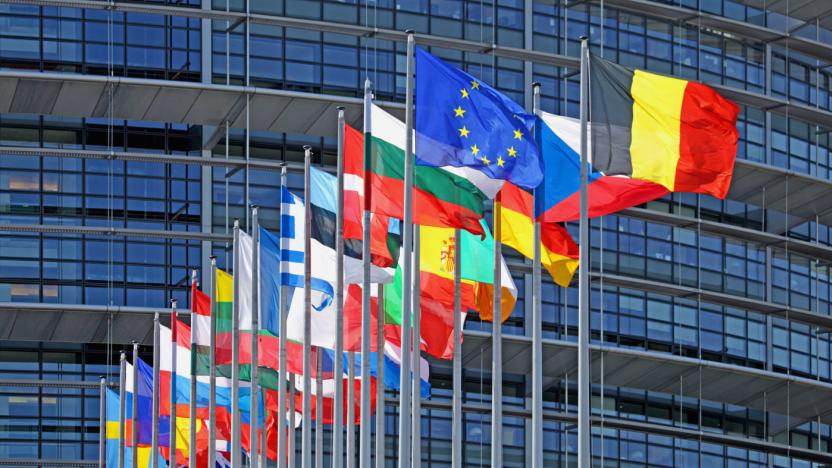DataProtection
Latest

Marco Rubio proposes a totally uninspiring data privacy bill
Senator Marco Rubio (R-FL) announced Wednesday a new privacy bill aimed at protecting personal data of American consumers from being sucked up indiscriminately by tech giants, according to Axios. The American Data Dissemination Act would ask the Federal Trade Commission to recommend potential rules and regulations that Congress would finalize. The rules created under the proposed law would preempt any state laws, which runs the risk of stripping states of their power to protect citizens.

A federal privacy draft bill could arrive in early 2019
A federal privacy bill draft may arrive early next year, which could pave the way for a US version of the European Union's strict General Data Protection Regulation rules. Democratic Senator Richard Blumenthal is working with Republican Jerry Moran (who is chairman of the consumer protection, product safety, insurance and data security subcommittee) on a bipartisan privacy bill and expressed hope the draft will be ready soon, according to Reuters.

An early test of the GDPR: taking on data brokers
Major data brokers Acxiom and Oracle are among seven companies accused of violating GDPR laws on personal information privacy. Advocates hope the complaints will shed light on the opaque ways that personal data is traded through third parties online both in the EU and the US. The General Data Protection Regulation is a sweeping personal data privacy law that came into force in late May in the EU. For the rest of the world, it's viewed as a bellwether for whether Big Tech can be held in check when immense data leaks seem to happen with painful regularity.

Senator Wyden wants to jail execs who don't protect consumer data
Sen. Ron Wyden (D-OR) released a draft the Consumer Data Protection Act, which would create new protections for consumer information and strict punishments for those found to be abusing user data. The proposed bill would send senior executives to jail for 10 to 20 years if they fail to follow the guidelines for data use.

Who controls your data?
The average American, one study tell us, touches their phone 2,600 times per day. By the end of a given year, that's nearly a million touches, rising to two million if you're a power user. Each one of those taps, swipes and pulls is a potential proxy for our most intimate behaviors. Our phones are not only tools that help us organize our day but also sophisticated monitoring devices that we voluntarily feed with interactions we think are private. The questions we ask Google, for instance, can be more honest than the ones we ask our loved ones -- a "digital truth serum," as ex-Googler and author Seth Stephens-Davidowitz writes in Everybody Lies: Big Data, New Data, and What the Internet Can Tell Us About Who We Really Are. Hoover up these data points and combine them with all of our other devices -- smart TVs, fitness trackers, cookies that stalk us across the web -- and there exists an ambient, ongoing accumulation of our habits to the tune of about 2.5 quintillion (that's a million trillion) bytes of data per day.

Mark Zuckerberg will testify at a joint Senate hearing on April 10th
As details of the Cambridge Analytica scandal emerged, Facebook CEO Mark Zuckerberg was asked to testify before multiple Congressional committees as well as the UK Parliament. Earlier this week, the US House of Representatives confirmed that Zuckerberg had agreed to appear before the House Energy and Commerce Committee on April 11th and now, the Senate has announced that the CEO will also testify at a joint Senate hearing. On April 10th, Zuckerberg will appear before the Senate Judiciary Committee and the Committee on Commerce, Science and Transportation.

Facebook wanted users’ medical data for a research project
CNBC reports today that Facebook was recently designing a research project that would collect users' Facebook data and medical information in order to develop insights into how social data could inform treatment development and patient care. The project has since been halted, but the company had approached a number of health organizations including Stanford Medical School and the American College of Cardiology.

Read Mark Zuckerberg's media Q&A on data security
Yesterday, Facebook CEO Mark Zuckerberg hosted a call with the media in which he spoke about the Cambridge Analytica situation and how Facebook is working to protect its users' data going forward. The transcript of that call, including the Q&A that took place after Zuckerberg made his opening remarks, is now available online. The company has posted it as part of its "Hard Questions" series, which has previously tackled subjects like whether social media is good for mental health and democracy, how Facebook counters terrorism and hate speech.

UK publishes first draft of new, stricter data protection laws
The UK's Data Protection Act 1998 is staring retirement in the face, as the government has now published the first draft of the new Data Protection Bill designed to replace it. We actually know quite a bit about the bill already. It was first mentioned in the Queen's Speech in June, with many of the finer details revealed last month. Among the headline provisions is a new power for the public to request social networks delete anything they posted before the age of 18, informally known as "the right to innocence."

UK snooping laws could sever EU data ties come Brexit
As it stands, the sharing of data between businesses, law enforcement agencies and such across EU countries is relatively straightforward. That's because of various laws and agreements in place across the EU that set standards for data movement, protection and privacy. In other words, countries are all on the same page and know what is expected of them. But in the future, the UK won't be part of the EU anymore, which is why the government has now published a set of proposals laying out how Britain hopes to keep data flowing between it and the continent post-Brexit.

New data privacy laws will let Brits erase childhood social posts
The UK's Data Protection Act began looking long in the tooth some time ago. It was introduced in 1998 when the internet was a very different place, after all, and today the government has published more details on the upcoming Data Protection Bill, which will update laws to ensure they're fit for the hyper-connected era. Delivering on a Conservative Party manifesto pledge, the bill will introduce a new right for people to instruct social networks to delete anything they posted before the age of 18.

Queen's Speech 2017: What it means for UK tech
The General Election has been and gone, but questions remain regarding the suitability of Theresa May as Britain's premier. Nonetheless, as part of traditional ritual, MPs have once again descended upon the House of Lords for the reading of the Queen's Speech, where Her Majesty details the formal plan for the current government. Brexit and Britain's security were the banner announcements, but technology also played a key part, with driverless cars and spaceports the notable inclusions.

Europe proposes stricter privacy rules for messaging apps
Less than a year after passing a strict set of data-protection laws, and the European Commission is already proposing some additions to bring them up to speed with the current reality online. As it stands, web services and communications apps like Facebook Messenger, WhatsApp, Gmail and iMessage aren't subject to the same privacy rules that cover telecoms operators. If the commission's proposal is approved, Europe's ePrivacy Directive would be extended to cover those apps, while also adding some controversial new rules on how cookies are used.

German draft law would limit your data privacy rights
Germany has generally been protective of privacy as of late, but it might take a step backward. The country's union for data protection has revealed that an interior ministry draft law would seriously curtail data privacy rights. You wouldn't have the right to know what data people are collecting about you if that disclosure "disadvantages the well-being" of Germany, or will "seriously endanger" business activities. It would also greenlight facial recognition software for video surveillance, and prevent data protection commissioners from either sanctioning security agencies for breaches or conducting follow-up checks when legal or medical information leaks.

EU approves stricter data-protection rules
The European Parliament today voted in favor of broad new data-protection laws that apply to any company operating within the European Union, regardless of where it is based. First proposed more than four years ago, they represent a significant modernization of regulations drawn up in 1995, long before the internet and digital services had matured to the point they're at now. Various EU authorities agreed upon the rules late last year, and they were formally green-lit today. At their heart, the rules make companies more accountable for data protection and give citizens more control over the information held on them.

US and Europe reveal how they'll protect your personal data
The US and EU have published a big pile of documents that spill the beans on the pair's replacement for Safe Harbor. The new provision is known as the EU-US Privacy Shield and is designed to limit how much personal data the NSA (amongst others) can access. The files also call for the creation of an independent regulator that'll handle complaints from users which will be funded by contributions from internet companies. The most interesting factoid we've spotted so far is that firms like Facebook can choose if it wants to be subject to American or European data protection law -- although it'll default to the former.

Google Glass gets no special treatment under UK data collection laws
Google Glass is now available for general consumption in the UK, which means us Brits can start debating all the privacy and legal issues associated with people carting around cameras on their face. In reaction to the wearable's launch, The Information Commissioner's Office -- the independent regulator of data protection, privacy and freedom of information rights -- has decided to clarify exactly how Glass fits into current legislation. And, quite understandably, the spectacles don't have their own set of special rules. Anything you record through Glass for personal, non-commercial use complies with the Data Protection Act, just like using a regular camcorder or taking a picture with your smartphone in a public place. Similarly, companies and other organisations need to comply with all the same rules governing the collection and processing of images and video they do currently.

European data authorities confirm Facebook facial recognition software deletion
After landing itself in hot water with the Irish Data Protection Commissioner (DPC) and Hamburg's Data Protection Authority (DPA), Facebook has deleted all of its European photo tagging facial recognition data. After reviewing the company's source code and deletion process, DPC spokesperson Ciara O'Sullivan confirmed today that the regulatory agency was satisfied with the social network's compliance. Additional removal confirmation came from Hamburg's DPC's technical department, which also reviewed the firm's software to ensure that its standards were met. In a recent comment to CFO World, a Facebook spokesperson confirmed that the data had been deleted and that the social network has no plans to reinstate facial recognition software in Europe anytime soon. No word on whether Facebook will now purchase sadface.com for... oh, $80 million or so.

A look at Apple's security efforts in 2012
Digital security is a topic that always seems to grow in importance, and with each wave of new Apple hardware, security sleuths go back to work examining what new exploits exist and what old holes have been patched up. Rich Mogull of TidBITS recently took an exhaustive look at Apple's 2012 security changes, and overall, it appears the company is indeed on the right track. "Apple's security is, across the board, stronger now than at any time in the nearly eight years I've been researching and writing about the company's products and services," writes the veteran security analyst. Mogull goes on to praise the addition of Gatekeeper in the latest OS X iteration, as well as iOS 6's ability to hold off most proper (read: untethered) jailbreaking efforts. However, Mogull is quick to note that no form of digital security is foolproof, and things have a habit of changing rather rapidly in the world of digital privacy. Still, the outlook -- at least in terms of Apple's efforts -- is good, and as long as Apple doesn't fall asleep at the wheel, Mac and iOS users appear to be in capable hands. You can read the full rundown on TidBITS.

Facebook shutting down facial recognition in the EU, gets stamp of approval from Ireland DPC
Earlier this year, Ireland's Data Protection Commissioner, a body whose decisions impact Facebook's policies in Europe at large, made several recommendations to bring the website in line with regional privacy laws, calling for greater transparency on how users' data is handled and more user control over settings, among other things. The DPC just officially announced that Zuckerberg et al. have for the most part adjusted its policies accordingly. The biggest change involves the facial recognition feature, which attempts to identify Facebook friends in photos and suggest their names for tagging. The social network turned off this functionality for new users in the EU -- and it will be shutting it down entirely by October 15th. It's not like Ireland, home to Facebook's European HQ, is the first to give the site flack about such features: Germany was having none of it when the site introduced facial recognition last summer.










